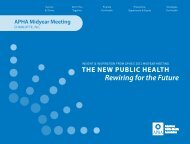EVIDENCE
missingevidence-digitalpdf-singlepages_2016
missingevidence-digitalpdf-singlepages_2016
You also want an ePaper? Increase the reach of your titles
YUMPU automatically turns print PDFs into web optimized ePapers that Google loves.
AFTERWORD<br />
by Tracey Brown<br />
The findings of Sir Stephen’s inquiry may reassure some<br />
people: it seems there isn’t evidence that research<br />
is frequently withheld from public discussion. There are<br />
rules that stipulate prompt publication and there are<br />
times when difficult (read politically awkward) research<br />
is published and handled well. Some positive points<br />
that we can hang onto along<br />
the challenging road ahead.<br />
Sir Stephen set<br />
out to investigate<br />
suppression<br />
but found weak<br />
rules and chaotic<br />
systems.<br />
But we should not be reassured,<br />
we should be alarmed. Sir Stephen<br />
set out to investigate suppression<br />
but found weak rules and chaotic<br />
systems. It turns out that we don’t<br />
know what has become of millions<br />
of pounds of governmentcommissioned<br />
research.<br />
Government itself doesn’t know: some departments have<br />
no idea how much research they have commissioned,<br />
whether it was published, or where it all is now.<br />
Just as alarming is the alacrity with which some parts<br />
of government put up apparently insurmountable obstacles<br />
to doing things that their peers in others manage without<br />
a problem. The sky has not fallen in at departments that<br />
maintain a research register. They continue to commission<br />
research, with the advantage of then knowing whether<br />
it’s been published — and where it is.<br />
Sense about Science spoke with the Cabinet Office<br />
and others about including a register in transparency<br />
plans when Sir Stephen first explored it early in the<br />
inquiry. We will respond to his recommendations<br />
by pressing firmly and publicly for it.<br />
A register, along with the recommended clearer<br />
contracts and rules about publication, will give<br />
the public confidence that information isn’t being kept<br />
from them and give researchers confidence in working<br />
with government.<br />
What of political manoeuvring? Sir Stephen says<br />
of course it influences publication of research,<br />
but he has cast it in a new light. When research isn’t<br />
published, it is not the confidence of the special advisers<br />
and political communicators winning through, but rather<br />
their lack of confidence. So the report advocates<br />
a smarter approach to communicating research<br />
in a political context. I’m so glad about this. Sense about<br />
Science works with the widest range of public groups<br />
on the most difficult issues. We find it puzzling that<br />
policy makers go in search of public trust and confidence<br />
— which is often why they commission independent<br />
research in the first place — and yet won’t trust the public<br />
with a discussion about the findings.<br />
I’m sure they don’t want to be in that position, and anyhow<br />
transparency is here to stay. This is an opportunity<br />
not only to recover millions of pounds of wasted<br />
research but to give politicians the out they need —<br />
publish or be damned.<br />
Tracey Brown is the director of Sense about Science<br />
37 AFTERWORD



